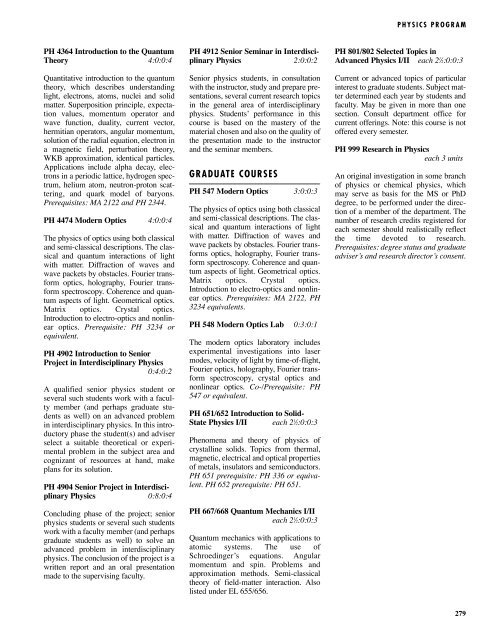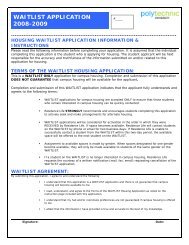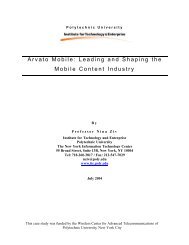POLYTECHNIC UNIVERSITY 2005-2007
POLYTECHNIC UNIVERSITY 2005-2007
POLYTECHNIC UNIVERSITY 2005-2007
You also want an ePaper? Increase the reach of your titles
YUMPU automatically turns print PDFs into web optimized ePapers that Google loves.
PHYSICS PROGRAM<br />
PH 4364 Introduction to the Quantum<br />
Theory 4:0:0:4<br />
Quantitative introduction to the quantum<br />
theory, which describes understanding<br />
light, electrons, atoms, nuclei and solid<br />
matter. Superposition principle, expectation<br />
values, momentum operator and<br />
wave function, duality, current vector,<br />
hermitian operators, angular momentum,<br />
solution of the radial equation, electron in<br />
a magnetic field, perturbation theory,<br />
WKB approximation, identical particles.<br />
Applications include alpha decay, electrons<br />
in a periodic lattice, hydrogen spectrum,<br />
helium atom, neutron-proton scattering,<br />
and quark model of baryons.<br />
Prerequisites: MA 2122 and PH 2344.<br />
PH 4474 Modern Optics 4:0:0:4<br />
The physics of optics using both classical<br />
and semi-classical descriptions. The classical<br />
and quantum interactions of light<br />
with matter. Diffraction of waves and<br />
wave packets by obstacles. Fourier transform<br />
optics, holography, Fourier transform<br />
spectroscopy. Coherence and quantum<br />
aspects of light. Geometrical optics.<br />
Matrix optics. Crystal optics.<br />
Introduction to electro-optics and nonlinear<br />
optics. Prerequisite: PH 3234 or<br />
equivalent.<br />
PH 4902 Introduction to Senior<br />
Project in Interdisciplinary Physics<br />
0:4:0:2<br />
A qualified senior physics student or<br />
several such students work with a faculty<br />
member (and perhaps graduate students<br />
as well) on an advanced problem<br />
in interdisciplinary physics. In this introductory<br />
phase the student(s) and adviser<br />
select a suitable theoretical or experimental<br />
problem in the subject area and<br />
cognizant of resources at hand, make<br />
plans for its solution.<br />
PH 4904 Senior Project in Interdisciplinary<br />
Physics 0:8:0:4<br />
Concluding phase of the project; senior<br />
physics students or several such students<br />
work with a faculty member (and perhaps<br />
graduate students as well) to solve an<br />
advanced problem in interdisciplinary<br />
physics. The conclusion of the project is a<br />
written report and an oral presentation<br />
made to the supervising faculty.<br />
PH 4912 Senior Seminar in Interdisciplinary<br />
Physics 2:0:0:2<br />
Senior physics students, in consultation<br />
with the instructor, study and prepare presentations,<br />
several current research topics<br />
in the general area of interdisciplinary<br />
physics. Students’ performance in this<br />
course is based on the mastery of the<br />
material chosen and also on the quality of<br />
the presentation made to the instructor<br />
and the seminar members.<br />
GRADUATE COURSES<br />
PH 547 Modern Optics 3:0:0:3<br />
The physics of optics using both classical<br />
and semi-classical descriptions. The classical<br />
and quantum interactions of light<br />
with matter. Diffraction of waves and<br />
wave packets by obstacles. Fourier transforms<br />
optics, holography, Fourier transform<br />
spectroscopy. Coherence and quantum<br />
aspects of light. Geometrical optics.<br />
Matrix optics. Crystal optics.<br />
Introduction to electro-optics and nonlinear<br />
optics. Prerequisites: MA 2122, PH<br />
3234 equivalents.<br />
PH 548 Modern Optics Lab 0:3:0:1<br />
The modern optics laboratory includes<br />
experimental investigations into laser<br />
modes, velocity of light by time-of-flight,<br />
Fourier optics, holography, Fourier transform<br />
spectroscopy, crystal optics and<br />
nonlinear optics. Co-/Prerequisite: PH<br />
547 or equivalent.<br />
PH 651/652 Introduction to Solid-<br />
State Physics I/II each 2 1 ⁄2:0:0:3<br />
Phenomena and theory of physics of<br />
crystalline solids. Topics from thermal,<br />
magnetic, electrical and optical properties<br />
of metals, insulators and semiconductors.<br />
PH 651 prerequisite: PH 336 or equivalent.<br />
PH 652 prerequisite: PH 651.<br />
PH 667/668 Quantum Mechanics I/II<br />
each 2 1 ⁄2:0:0:3<br />
Quantum mechanics with applications to<br />
atomic systems. The use of<br />
Schroedinger’s equations. Angular<br />
momentum and spin. Problems and<br />
approximation methods. Semi-classical<br />
theory of field-matter interaction. Also<br />
listed under EL 655/656.<br />
PH 801/802 Selected Topics in<br />
Advanced Physics I/II each 2 1 ⁄2:0:0:3<br />
Current or advanced topics of particular<br />
interest to graduate students. Subject matter<br />
determined each year by students and<br />
faculty. May be given in more than one<br />
section. Consult department office for<br />
current offerings. Note: this course is not<br />
offered every semester.<br />
PH 999 Research in Physics<br />
each 3 units<br />
An original investigation in some branch<br />
of physics or chemical physics, which<br />
may serve as basis for the MS or PhD<br />
degree, to be performed under the direction<br />
of a member of the department. The<br />
number of research credits registered for<br />
each semester should realistically reflect<br />
the time devoted to research.<br />
Prerequisites: degree status and graduate<br />
adviser’s and research director’s consent.<br />
279




